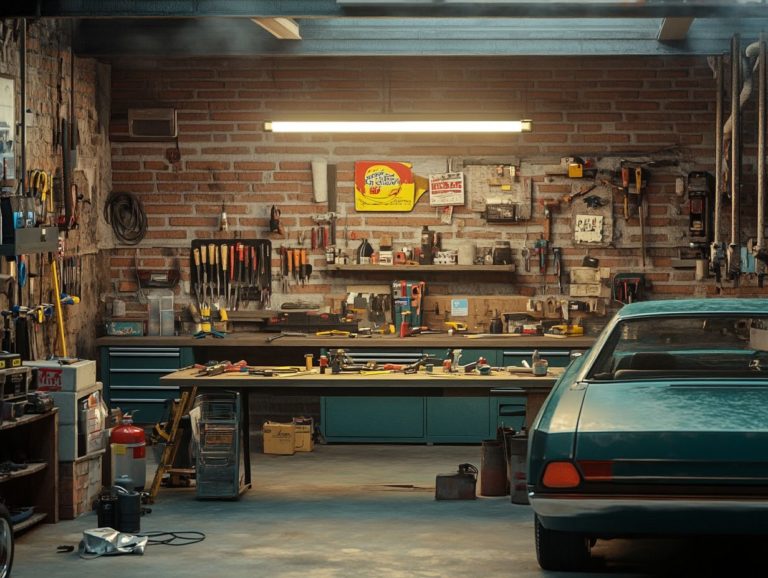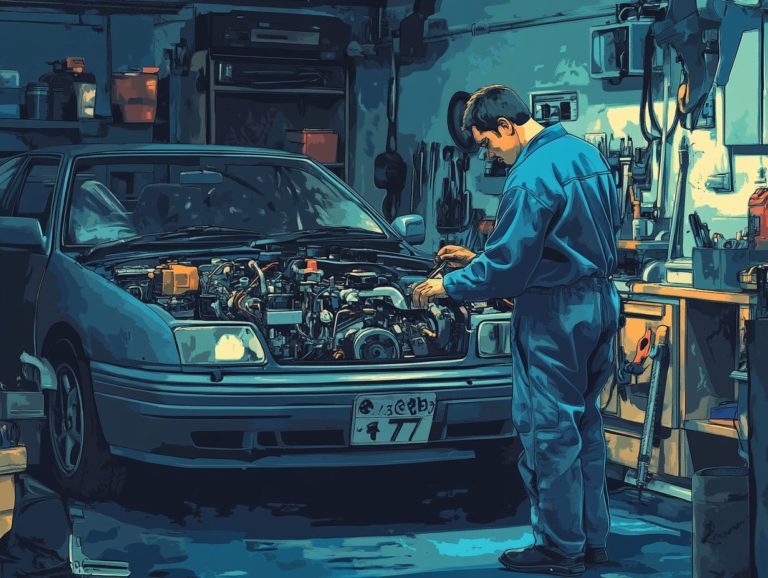How to Maintain Your Car’s Air Conditioning
Maintaining your car’s air conditioning system is essential for both comfort and functionality, especially in the sweltering heat of summer. A malfunctioning AC can leave you feeling sticky and irritable. Let s dive into the signs of a failing AC and how to keep it running smoothly.
This article will guide you through the signs of a failing air conditioning unit, offer maintenance tips, indicate when it s time to call in the professionals, and provide preventive measures to ensure long-lasting performance.
Dive in to discover how to stay cool on the road!
Contents
- Key Takeaways:
- Why is it Important?
- Signs of a Malfunctioning Air Conditioning System
- DIY Maintenance Tips for Your Car’s Air Conditioning
- Professional Maintenance and Repairs
- Preventive Measures for Long-Term Maintenance
- Frequently Asked Questions
- What is the purpose of maintaining my car’s air conditioning?
- How often should I maintain my car’s air conditioning?
- Can I maintain my car’s air conditioning system myself?
- What are some signs that my car’s air conditioning system needs maintenance?
- What are the benefits of regular maintenance for my car’s air conditioning?
- How can I maintain my car’s air conditioning system at home?
Key Takeaways:

- Regular maintenance of your car’s air conditioning is crucial for your comfort and safety on the road.
- Signs of a malfunctioning air conditioning system include strange noises, weak airflow, and unusual odors.
- DIY maintenance tips like cleaning and changing filters, and checking and recharging refrigerant can keep your car’s air conditioning running smoothly.
Why is it Important?
Understanding the importance of a well-functioning air conditioning system in your vehicle is essential, particularly during the sweltering summer months when comfort is non-negotiable.
A properly maintained AC system guarantees a refreshing flow of cold air, while also playing a vital role in your vehicle’s overall upkeep, enhancing both safety and enjoyment for everyone on board, including those lounging in the back seat.
An efficient air conditioner prevents moisture buildup, which can compromise air quality and lead to further maintenance challenges down the line.
Signs of a Malfunctioning Air Conditioning System
Recognizing the signs of a malfunctioning air conditioning system can spare you from expensive repairs and enhance your driving comfort. Whether you’re experiencing the unwelcome flow of warm air or hearing odd noises from the AC compressor, these symptoms are red flags. They often point to potential issues with refrigerant levels or other components of your air conditioning system that demand your immediate attention.
Identifying Issues and Possible Causes
To effectively identify issues with your air conditioning system, it s crucial for you to understand the common culprits that can hinder cooling performance and efficiency. Think along the lines of dirty air filters, low refrigerant levels, or a failing compressor.
Following regular maintenance tips can be invaluable in preventing these headaches and ensuring your AC system runs like a dream, even during the sweltering summer days. Make it a habit to check and replace your air filters every one to three months. A clogged filter doesn t just sit there; it restricts airflow and leads to a noticeable drop in cooling efficiency.
Keeping the condenser coils clean and free of debris is another smart move. A gentle brush or a quick hose-down can work wonders for performance. Don t forget about monitoring those refrigerant levels; low levels might signal a leak that requires professional assistance.
Setting your thermostat to a consistent temperature and steering clear of overcooling will not only boost your system s efficiency but also help extend its lifespan. By implementing these straightforward practices, you can ensure your AC operates smoothly throughout the season, keeping you comfortable when the heat is on.
DIY Maintenance Tips for Your Car’s Air Conditioning

Taking on DIY maintenance for your car’s air conditioning system is a wise move that ensures it operates at peak efficiency, especially during those scorching summer days. Additionally, understanding how to maintain your car’s electrical system can further enhance your vehicle’s overall performance. By regularly cleaning or replacing the air filter, checking the refrigerant levels, and conducting a necessary refrigerant recharge, you can greatly improve your AC system’s performance and extend its lifespan.
This proactive approach not only keeps you cool but also saves you from potential costly repairs down the line.
Don t wait until it s too hot! Start your maintenance today!
Cleaning and Changing Filters
Regularly cleaning and replacing your air and cabin filters is crucial for maintaining optimal airflow in your car’s air conditioning system. This simple task prevents issues stemming from dirty filters, which can compromise air quality and cooling performance.
By ensuring timely filter replacements, you not only achieve peak performance but also elevate your overall driving experience.
To get started, locate the air filter housing, typically situated near the engine compartment, and gently remove the old filter. A clean filter enhances efficiency by allowing your AC system to circulate air more freely, while a clogged filter can lead to poor airflow and increased energy consumption.
For cabin filters, access is usually through the glove compartment. Once you ve removed it, take a moment to inspect for dust and debris that could negatively impact air quality.
Keep an eye out for these signs that indicate your filters need replacement:
- Reduced airflow
- Unpleasant odors
- Visible dirt accumulation
By maintaining these filters regularly, you not only extend the lifespan of your AC system but also ensure the air inside your vehicle stays fresh and healthy.
Checking and Recharging Refrigerant
Regularly checking your refrigerant levels is essential for ensuring your air conditioning system operates efficiently, especially on those sweltering days when the demand for cool air peaks. If your levels are low, adding refrigerant not only revives your cooling performance but also helps prevent leaks that could lead to more significant issues down the line.
To kick off the process, gather the essential tools you ll need, such as:
- a manifold gauge set (a device used to measure pressure in your AC system)
- refrigerant scales
- safety gear like gloves and goggles
Turn off the AC unit and locate the service ports, where you’ll connect the manifold gauges. Once you have those gauges connected, take a moment to observe the pressure readings and compare them with the manufacturer specifications to see if a recharge is necessary. If it is, proceed cautiously to add refrigerant, ensuring you follow all safety guidelines to avoid any unwanted exposure.
Regular maintenance of proper refrigerant levels is crucial; neglecting this task can lead to reduced system efficiency, sky-high energy bills, and potential damage to the compressor. By keeping an eye on your refrigerant levels, you ensure your cooling system performs effectively when you need it the most.
Professional Maintenance and Repairs
When your DIY maintenance efforts fall short in addressing air conditioning issues, or if you’re uncertain about the state of your system, it’s crucial to seek the expertise of a qualified technician for professional maintenance and repairs.
By scheduling a service appointment at a reputable center, you ensure that your AC system undergoes a comprehensive inspection, diagnosis, and repair by specialists who truly understand the intricacies of vehicle air conditioning.
Your comfort deserves nothing less than expert care.
When to Seek Professional Help

Take charge of your car’s comfort! Knowing when to seek professional help for your vehicle’s air conditioning system is essential for ensuring optimal efficiency and preventing potential breakdowns. If you feel warm air when it should be cool, don t wait get it checked!
If you start to notice signs like unusual noises or persistent odors, it s time to reach out to a professional for a thorough diagnosis and necessary repairs.
A decrease in airflow or the compressor cycling frequently can indicate deeper issues that warrant expert attention. Ignoring these warning signs can lead to costly repairs act fast!
Being proactive about AC service is crucial, especially during those sweltering summer months when reliable cooling is a must. An experienced technician can assess refrigerant levels, check for leaks, and ensure that all components are operating smoothly, ultimately extending the lifespan of your air conditioning system.
What to Expect During a Maintenance Appointment
During a maintenance appointment for your air conditioning system, you can expect a thorough evaluation conducted by a qualified technician. They will check for leaks, assess refrigerant levels, and inspect various components, including the compressor and filters. This service is essential for preserving your vehicle’s cooling performance and ensuring optimal air quality.
The technician will also perform critical inspections and carry out diagnostics to uncover any underlying issues that could compromise efficiency, such as faulty electrical connections or pressure imbalances. Stay ahead of costly repairs! Regular check-ups catch minor issues before they become major headaches, ensuring your system operates smoothly throughout the year.
Simple tasks like cleaning or replacing air filters can significantly enhance airflow and reduce allergens, further improving the interior environment of your vehicle. Investing in this service not only extends the lifespan of your air conditioning system but also contributes to a more comfortable and safer driving experience.
Preventive Measures for Long-Term Maintenance
Implementing preventive measures for your vehicle’s air conditioning system is essential for ensuring maximum performance and efficiency, especially in challenging weather conditions. Additionally, understanding how to maintain your car’s transmission can further enhance your vehicle’s overall functionality.
By scheduling regular inspections, attending timely service appointments, and following DIY maintenance routines, you can significantly extend the lifespan of key components, ensuring your AC remains effective year after year.
Tips for Keeping Your Car’s Air Conditioning in Good Condition
To keep your car’s air conditioning in top-notch condition, consider practical tips that enhance both functionality and longevity. Regularly cleaning your car and using the defrost mode appropriately can prevent moisture buildup. Additionally, knowing how to maintain your car’s climate control is wise, along with consulting a reputable service center for periodic inspections to maintain refreshing cool airflow and ensure overall system efficiency.
Maintaining a clean vehicle interior goes beyond aesthetics; it plays a vital role in air quality and the efficiency of your air conditioning system. Routinely vacuum your carpets and upholstery, as dirt and debris can obstruct airflow and diminish performance.
Don t forget to replace your cabin air filters regularly; these little heroes trap pollutants and ensure only fresh air circulates through the vents. When seeking professional maintenance, look for technicians who specialize in automotive air conditioning and use high-quality refrigerants and lubricants.
By following these practices, you ll not only enjoy a more energy-efficient ride but also a significantly more pleasant driving experience.
Frequently Asked Questions

-
What is the purpose of maintaining my car’s air conditioning?
Proper maintenance of your car’s air conditioning system is crucial for ensuring it continues to function efficiently. Learning how to maintain your car’s air conditioning system can provide you with cool air during hot weather and help prevent potential costly repairs in the future.
-
How often should I maintain my car’s air conditioning?
It is recommended to have your car’s air conditioning system checked and serviced at least once a year, preferably before the start of summer when it will be used more frequently.
-
Can I maintain my car’s air conditioning system myself?
While some minor maintenance tasks can be done at home, it is best to have a professional technician handle the maintenance of your car’s air conditioning system to ensure it is done correctly and safely.
-
What are some signs that my car’s air conditioning system needs maintenance?
If you notice that your car’s air conditioning is not blowing cold air, has a strange odor, or makes unusual noises, it is a good idea to have it checked by a professional technician for maintenance.
-
What are the benefits of regular maintenance for my car’s air conditioning?
Regular maintenance can help prolong the lifespan of your car’s air conditioning system, improve its efficiency, and save you money on potential costly repairs in the future. To learn more, check out our guide on how to maintain your car’s cooling system.
How can I maintain my car’s air conditioning system at home?
You can easily maintain your car’s air conditioning system at home. Start by cleaning or replacing the air filter, and consider following this guide on how to maintain your car’s cooling system for optimal performance.
Next, check the cooling fluid levels. Make sure the condenser, which helps to cool the air, is free from debris.
Regular maintenance can keep your car cool and comfortable. Don’t wait until it’s too hot to take action!





